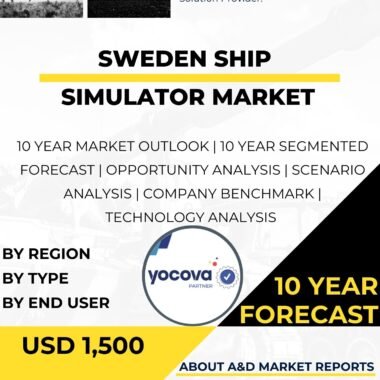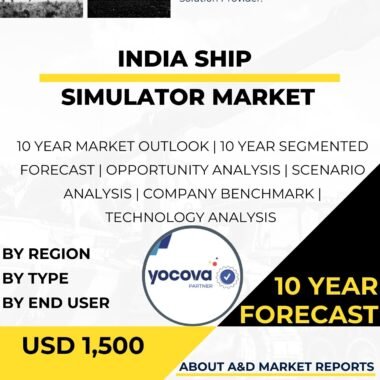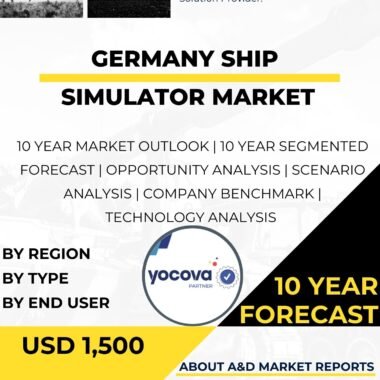Description
The Saudi Arabia Ship Simulator Market is a vital and rapidly growing segment within the country’s maritime training and simulation industry. Ship simulators are sophisticated training systems that replicate real-life scenarios and conditions faced by maritime personnel, providing a safe and immersive environment for learning and honing essential skills. As a key player in the Middle East region with a vast coastline along the Red Sea and the Arabian Gulf, Saudi Arabia recognizes the strategic importance of investing in ship simulation technology to enhance maritime safety, support workforce development, and promote a thriving maritime industry.
The Saudi Arabia Ship Simulator Market is characterized by a mix of international and domestic companies that specialize in simulator development and manufacturing. International simulation technology providers, such as Kongsberg Maritime, Transas, and W?rtsil?, have a significant presence in the market and offer a wide range of ship simulation solutions.
One of the primary drivers of the Saudi Arabia Ship Simulator Market is the country’s focus on maritime safety and professional training. As a nation with critical maritime trade routes and significant economic interests at sea, Saudi Arabia recognizes the importance of well-trained and competent maritime personnel. Ship simulators play a crucial role in training bridge crews, ship navigators, and marine engineers, enabling them to acquire practical experience and skills in a controlled and risk-free environment.
Moreover, as a country with a thriving maritime industry, including shipbuilding, shipping, and offshore operations, Saudi Arabia requires a skilled and knowledgeable maritime workforce. Ship simulators offer comprehensive training programs for a wide range of maritime disciplines, including ship handling, navigation, dynamic positioning, engine room operations, and crisis management.
The Saudi government’s Vision 2030 economic diversification plan also influences the Ship Simulator Market. As part of this vision, Saudi Arabia aims to develop a robust domestic maritime industry capable of contributing significantly to the national economy. This includes investing in advanced training and simulation infrastructure, fostering partnerships with international simulation providers, and encouraging knowledge transfer to local institutions.
Localization of ship simulator manufacturing aligns with the broader goal of creating high-skilled job opportunities for Saudi citizens and promoting research and development within the country.
Full-mission simulators provide a highly immersive experience, replicating the entire bridge or engine room of a vessel. These simulators allow trainees to practice a wide range of scenarios, including navigation in various weather conditions, port maneuvers, and emergency response.
Part-task simulators focus on specific aspects of maritime training, such as radar operation, ship handling, or engine room procedures. These simulators offer targeted training to enhance specific skills and competencies.
Engine room simulators provide realistic scenarios for training marine engineers and technicians in operating and maintaining ship engines and systems.
The Saudi Arabia Ship Simulator Market is witnessing significant technological advancements. The development of high-fidelity visual displays, advanced physics engines, and virtual reality technology has transformed ship simulation, offering trainees a more realistic and engaging experience.
Additionally, the integration of ship simulators with other training systems, such as bridge resource management (BRM) and electronic chart display and information systems (ECDIS), enhances the overall effectiveness of maritime training. Integrated training programs help bridge crews and marine engineers develop teamwork, communication, and decision-making skills crucial for safe and efficient maritime operations.
The Saudi Arabia Ship Simulator Market also faces challenges related to meeting the increasing demand for training and simulation services across various maritime sectors. As the country’s maritime industry continues to grow, the need for well-trained maritime personnel is rising. Ensuring the availability of sufficient simulators and qualified instructors to meet this demand is critical.
To address these challenges and take advantage of the opportunities, the Saudi government is investing in ship simulator technology and infrastructure. Establishing state-of-the-art simulation centers, partnering with leading simulation providers, and providing comprehensive training for maritime instructors are essential elements of this effort.
Moreover, the government is promoting collaboration with international maritime academies and institutions to exchange best practices and enhance the quality of maritime education and training in the country.
In conclusion, the Saudi Arabia Ship Simulator Market is a vital and evolving component of the country’s maritime training and simulation infrastructure. As the Saudi government continues to prioritize maritime safety and workforce development, the demand for advanced ship simulation technology is expected to grow.
International simulation technology providers with expertise in maritime training and simulation will continue to play a significant role in this market. However, the Saudi government’s focus on economic diversification and indigenous maritime industry development will drive increased collaboration and technology transfer initiatives.
By fostering local research and development, training programs, and investments in ship simulator technology and infrastructure, Saudi Arabia aims to build a robust and self-sufficient ship simulator industry, ensuring a well-trained and competent maritime workforce.
As the Kingdom seeks to enhance its maritime safety, support its maritime industry, and maintain its position as a key player in the global maritime domain, the Ship Simulator Market will remain a critical area of focus within the broader maritime education and workforce development efforts.




